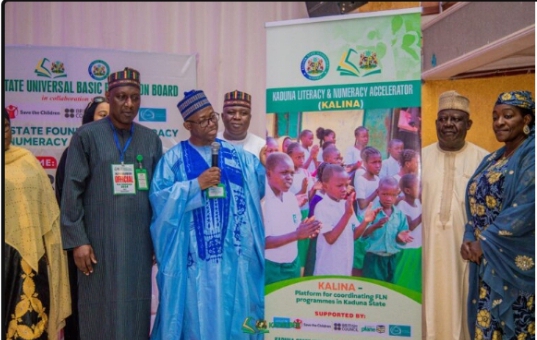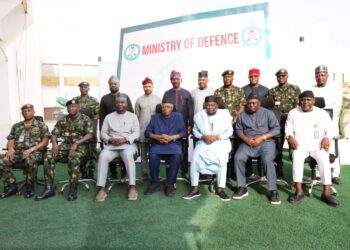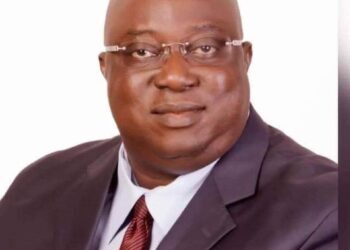In an effort to further improve ‘Foundational Literacy and Numeracy (FLN)’, the Gov. Uba Sani of Kaduna State has inaugurated the Kaduna Literacy and Numeracy Accelerator (KALINA).
KALINA is aimed at improving the learning outcomes of primary school pupils in the state, and also serves as a platform for coordinating FLN programmes in the state.
It is also part of the state government’s efforts to address the learning gaps in its education system, where it would focus on providing high-quality teacher training, and community engagement.
Sani, represented by the State Commissioner for Education, Prof. Muhammad Bello, inaugurated KALINA at a two-day seminar, which began on Tuesday, organised by the State Universal Basic Education Board (SUBEB).
The seminar was supported by the partners on the FLN, that included: UNICEF, British Council, Partnership for Learning for All in Nigeria (PLANE), Save the Children International (SCI) Nigeria and Teaching at the Right Level (TaRL) Africa, among others.
The theme of the seminar was “Supporting the Sustain Agenda to Resolve the Learning Crisis in the State”.
Speaking at the seminar, Sani emphasised the critical role of literacy and numeracy skills in driving economic growth and development.
He equally said KALINA would enhance the literacy and numeracy skills of primary school pupils, thereby providing them with a strong foundation for future academic success.
Sani said that KALINA was part of his administration’s comprehensive strategy to address the learning gaps in the state’s education system.
He charged the implementation team to work tirelessly to ensure its success, leveraging technology and innovative approaches to reach vulnerable children.
“With the inauguration of KALINA, we are committed to education and determined to leave a lasting legacy in the sector in Kaduna State,”he said
Earlier, one of the FLN partners, the Chief of Field Office, UNICEF Kaduna, Gerida Birukila, said Nigeria was currently facing a deep learning crisis, with children from poor households and rural areas being the most affected.
Birukila, represented by Mr Bala Dada, the Education Officer, UNICEF Kaduna, said schooling does not equate to learning.
She stated that the 2022 Kaduna State Bureau of Statistics survey found a learning poverty rate of 74.7 per cent.
”This means children who cannot read and understand a simple story or perform simple mathematics by the end of primary school.
”If the current trend continues, the children will be denied education.
”Thereby, setting in motion a life of missed opportunities including the chance to develop the transferable, digital and job-specific skills they need to break cycles of intergenerational poverty,”she said.
Birukila lamented that in spite of the efforts by the Nigerian government, donors, and other stakeholders, the problem of non-learning in schools was still persisting.
According to her, the situation is made worse by poverty, conflicts, displacements, remoteness, poor access to learning resources and in the recent past, the COVID-19 pandemic.
She, however, said that while the numbers were disturbing, all hope was not lost.
Birukila said, “UNICEF has been supporting state governments to implement effective evidence-based programmes to strengthen FLN skills such as a play based Early Childhood Education for pre-primary learners.
“We also support in implementing Reading and Numeracy Activity (RANA), Teaching at the Right Level (TARL) as well as a school-based teacher professional development approach to support teachers.”
According to her, the approaches were effective and significantly improved student learning outcomes across various parts of the country including the state.
She further said that the models have proved to be cost-effective with Kaduna State showing increased interest and support by committing to fund a statewide scale-up of TaRL and other FLN strategies.
Birukila, therefore, said addressing the persisting learning poverty in the states requires examination of the evidence of what works and explore further partnerships with the State, NGOs, development partners and communities.
Presenting the overview of the Learning Poverty (LP) in Kaduna state, Amina Aliyu from the state’s Bureau of Statistics, said the overall Schooling Deprived (SD) of primary school-age stood at 31.1 per cent.
By gender, she said the SD for male, and female stood at 30.0 per cent and 32.3 per cent respectively.
Similarly, Aliyu said the overall learning deprived (LD) stood at 63.3 per cent while by gender, for males, and females stood at 59.2 per cent and 67.5 per cent, respectively.
Furthermore, she said, ‘Overall, the Learning Poverty Indicator (LPI) for the state is 74.7 per cent, whereas gender, for males and females are 71.4 and 78.0 per cent, respectively.
” Kauru LGA has the highest LPI of 97.5 per cent while Jema’a LGA has the least of 10.1 per cent.”
She explained that the findings have corroborated the proclamation of UNICEF and the World Bank.
“In August 2022, UNICEF reported that no fewer than 70 per cent of children in Nigerian
schools are suffering from LP (a situation where 10-year-olds cannot read or
understand a simple text) while UNESCO put the number of out-of-school children in the country at 20 million in October 2022.
“Similarly, according to the World Bank, Nigeria is experiencing LP in which 70 per cent of 10 year olds cannot understand a simple sentence or perform basic numeracy tasks,”she said.
Aliyu, therefore, among other recommendations, called for increased efficiency of instruction, adoption of effective teaching practices that support teachers cost effectively in their immediate classroom challenges.
She also recommended practices like
structured pedagogy programs and tools to target instruction to students’ current
learning levels.(NAN











